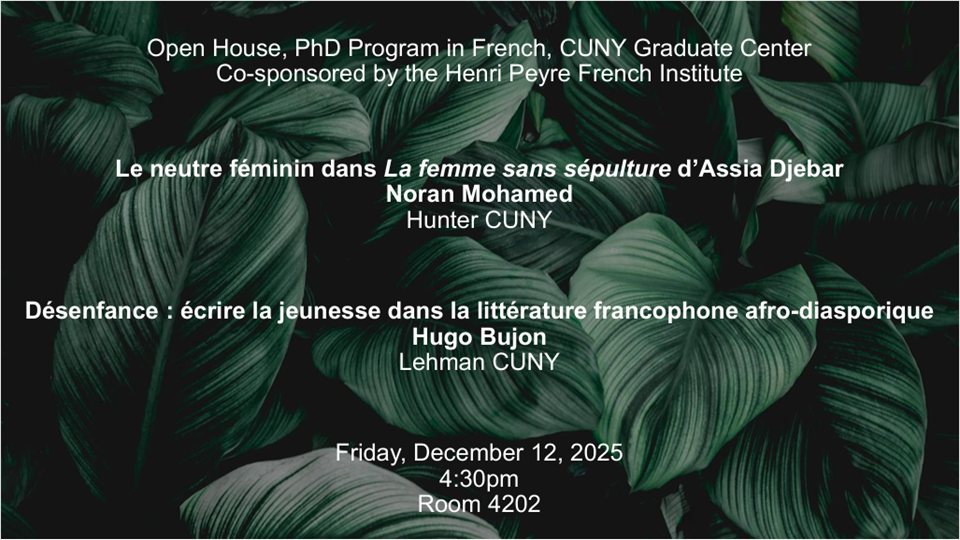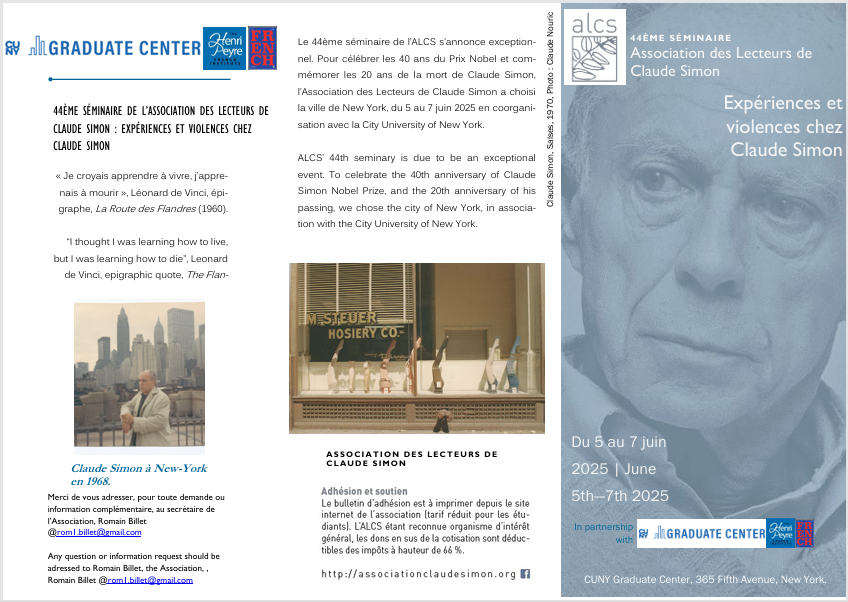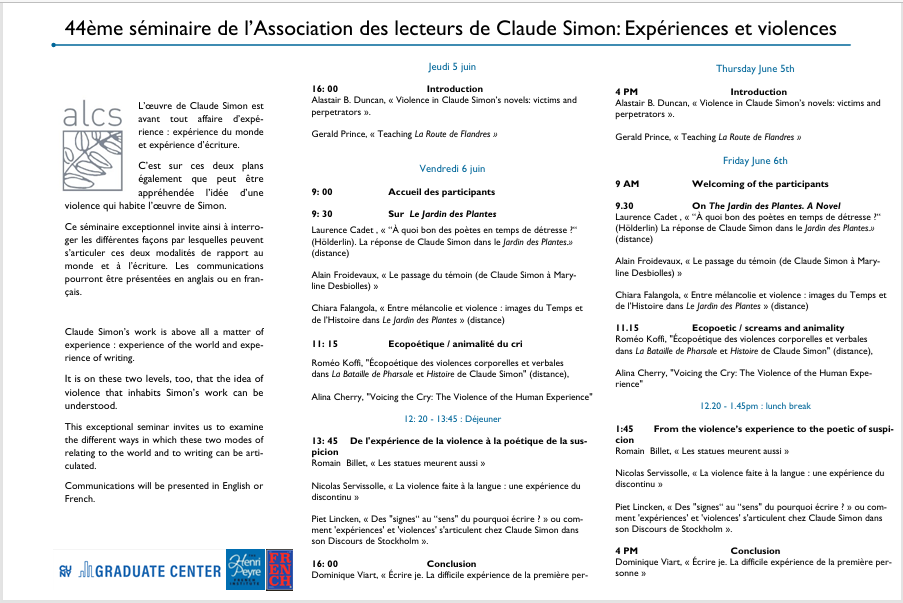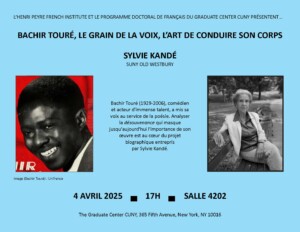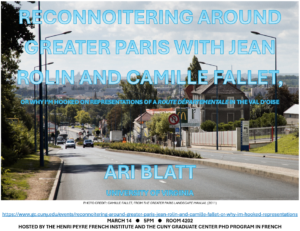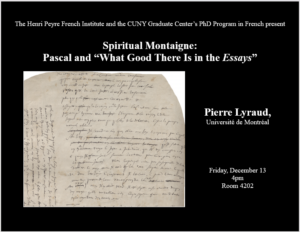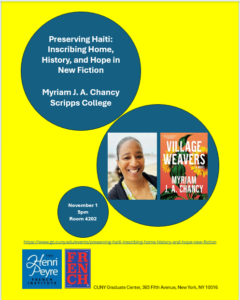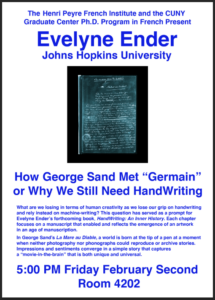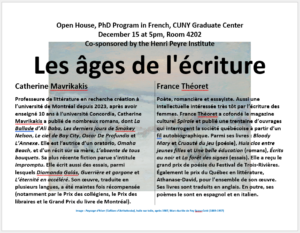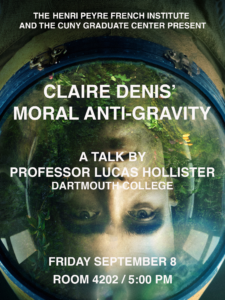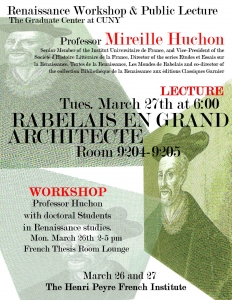Spring 2026
April 24
6pm
Room C198, CUNY Graduate Center
Against Innocence: Miriam Ticktin in Conversation with Ruth Wilson Gilmore
March 17
6pm
Kelly Skylight Room 9100, CUNY Graduate Center
Fall 2025
“In the Solitude of Cotton Fields” by Bernard-Marie Koltès, directed by translator Amin Erfani (Iran/US)
September 5-7, 2025
7:30pm
Location: Greenwich Village Waterfront, Hudson River Park, Pier 46
Sponsored by the Martin E. Segal Theatre – CUNY Graduate Center, the Henri Peyre French Institute, & the CUNY Graduate Center’s PhD Program in French
https://www.downtoearthfestival.org/in-the-solitude-of-cotton-fields
Join us for an evening at the Christopher Street Piers, the now gentrified Greenwich Village waterfront of Hudson River Park. Once one of the most vital spaces for New York’s LGBTQ community, the piers 42, 45, 46, and 51 served for decades as living quarters for queer homeless youth, a casual hangout and meeting spot for LGBTQ groups of friends. It was a legendary hangout, a refuge, a locale for sex, a beach, a dance floor, an art gallery—a place of thrills, of danger, of comfort, of joy. One of the most important European playwrights of the 20th century, Bernard-Marie Koltès from Paris, was inspired by it. His most famous play “In the Solitude of Cotton Fields” (“Dans la solitude des champs de coton”) takes place at the Christopher Street Piers.
In this celebrated masterpiece, a Dealer stops a Client on the Piers, at the dark hour of twilight, peddling hidden merchandise which the Dealer keeps secret. The Client, in return, refuses to reveal why he has come here, at this hour, and what he truly desires from the Dealer. This encounter, at the brink of bursting into a street fight or turning into a flirtation, transforms traditional dramatic dialogue into a succession of long poetic monologues, reaffirming language as the main medium of this dramatic form.
Summer 2025
Expériences et violences chez Claude Simon
Jeudi 5 juin : 16h, salle 4116 → 17h, salle 4202
Vendredi 6 juin : de 9h à 17h, salle 4202
Spring 2025
Bachir Touré, le grain de la voix, l’art de conduire son corps
Bachir Touré (1929-2006), comédien et acteur d’immense talent, a mis sa voix au service de la poésie. Analyser la désouvenance qui masque jusqu’aujourd’hui l’importance de son oeuvre est au coeur du projet biographique entrepris par Sylvie Kandé (SUNY Old Westbury).
Reconnoitering Around Greater Paris with Jean Rolin and Camille Fallet, or Why I’m Hooked on Representations of a Route Départementale in the Val d’Oise
Ari Blatt (University of Virginia) explores the “démarche” in Jean Rolin’s texts and in Camille Fallet’s photographs.
Jean Rolin is one of France’s most prominent arpenteurs, or surveyors, of ordinary French places. Two of his most recent books, Le Pont de Bezons (2020) and La Traversée de Bondoufle (2022), once again offer meticulous descriptions and nuanced observations of the proximate, sites relatively close to Rolin’s home in Paris that remain, for the most part, off-the-beaten path, occasionally deserted, and unknown or “insufficiently known” to the author (and, as he presumes, to most of his readers). In this talk, I examine Rolin’s démarche, approaching that term as both a way of walking and a course of action. Deambulation, for Rolin, is as much a form of movement as it is a kind of reading. Which perhaps helps to explain why I am moved when I read about Rolin walking.
Inquiring further into this response, I propose to mobilize these two itinerant narratives—along with work by photographer Camille Fallet, whose Greater Paris Landscape Manual shares some striking affinities—as a laboratory for experimenting with an interpretive method that allows for consideration of my own attachment to these two artists’ reconnaissance missions into distinct swaths of the urban and peri-urban periphery around Greater Paris.
Why, I ask, am I so keen on these verbal and visual forays into everyday landscapes in the Île de France, places marked by friches and terrains vagues, chain hotels, parking lots, riverways, roundabouts, and other topographic features that, as even Rolin admits, are “peu engageant”? Is it simply because I care about the same things as they do? Is it because I appreciate the way Rolin’s texts and Fallet’s photographs invent an idea, and an imaginary, of the territory? Or might these artists’ interest in inventorying the mundane matter to me because it informs how I read and resonates with the way I dwell in the world?
Spiritual Montaigne: Pascal and ‘what good there is in the Essays
Montaigne/Pascal: “everything has been said, and we’ve come too late”? Indeed, much has been said about the author of the Pensées‘ in-depth knowledge of the Essays. But while a great deal of attention has been paid to the harshness of this reading, its partiality, and its insistence on human misery, the omnipresence of Montaigne has in fact and curiously been underestimated, for the author of the Essays shapes Pascal’s portrait of “the misery of man without God” as well as his depiction of “the happiness of man with God.” Can Montaigne be considered, in Pascal, a spiritual guide–and one of the very first? Pierre Lyraud (Université de Montréal) will explore this possibility.
Preserving Haiti: Inscribing Home, History, and Hope in New Fiction
Myriam J. A. Chancy will talk about the process of writing narratives that speak of Haiti and its Diaspora, traversing difficult historical moments and how to frame those moments in ways that productively preserve a sense of Haiti’s complex history, cultural vitality, and hope for better futures. The author will speak about and through her last two novels, What Storm, What Thunder (2021), about the 2010 Haiti earthquake, and Village Weavers (2024), which spans from the 1940s to the early 2000s and is a Time Best Book of April 2024.
Myriam J. A. Chancy has received multiple awards, including an American Book Award from the Before Columbus Foundation, the Guyana Prize in Literature, a Foreword INDIES Book of the Year Award Gold Prize, and the Isis Duarte Book Prize. Her previous novel, What Storm, What Thunder, was named a “Best Book of 2021,” by NPR, Kirkus, Library Journal, the Boston Globe, the Globe & Mail, shortlisted for the Caliba Golden Poppy Award & Aspen Words Literary Prize, and longlisted for the Brooklyn Public Library Book Prize & the OCM Bocas Prize. Her past novels include: The Loneliness of Angels, The Scorpion’s Claw, and Spirit of Haiti. She is also the author of several academic books, including Harvesting Haiti: Reflections on Unnatural Disasters and Framing Silence: Revolutionary Novels by Haitian Women. Recent writings have appeared in Whetstone.com Journal, Electric Literature, and Lit Hub. She is a Fellow of the John Simon Guggenheim Memorial Foundation and HBA Chair of the Humanities at Scripps College in California.
From Universal Emancipation to Capitalist Slavery
This talk by Nick Nesbitt (Princeton University) will examine the complex legacy of the Haitian Revolution in its relation to global capitalism. The Haitian Revolution incontestably constitutes the most advanced political intervention of the age of revolutions from the perspective of its immediate and universal abolition of slavery. At the same time, from the perspective of Marx’s critique of the subject of human rights and the capitalist social form, we must continue to interrogate the subject of 1804 and universal emancipation, to ask whether, paradoxically, that henceforth free subject is not precisely the necessary subject of global capital, a peripheral subject now free to offer up their labor power as the unique commodity capable of feeding what Marx called Capital, the automatische Subjekt.
How George Sand Met “Germain” or Why We Still Need Handwriting
What are we losing in terms of human creativity as we lose our grip on handwriting and rely instead on machine-writing? This question has served as a prompt for Evelyne Ender’s forthcoming book, HandWriting: An Inner History. Each chapter focuses on a manuscript that enabled and reflects the emergence of an artwork in an age of manuscription. In her talk, Evelyne Ender (Johns Hopkins University) will revisit the manuscript of George Sand’s La Mare au Diable: a world is born at the tip of a pen at a moment when neither photography nor phonographs could reproduce or archive stories. Impressions and sentiments converge in a simple story that captures a “movie-in-the-brain” that is both unique and universal.
Fall 2023
Les âges de l’écriture
Catherine Mavrikakis (Université de Montréal) and France Théoret (recipient of the Athanase-David prize) will discuss literary representations of aging. The talk will be in French.
Professeure de littérature en recherche création à l’université de Montréal depuis 2023, après avoir enseigné 10 ans à l’université Concordia, Catherine Mavrikakis a publié de nombreux romans, dont La Ballade d’Ali Baba, Les derniers jours de Smokey Nelson, Le ciel de Bay City, Oscar De Profundis et L’Annexe. Elle est l’autrice d’un oratorio, Omaha Beach, et d’un récit sur sa mère, L’absente de tous bouquets. Sa plus récente fiction parue s’intitule Impromptu. Elle écrit aussi des essais, parmi lesquels Diamanda Galás, Guerrière et gorgone et L’éternité en accéléré. Son œuvre, traduite en plusieurs langues, a été maintes fois récompensée (notamment par le Prix des collégiens, le Prix des libraires et le Grand Prix du livre de Montréal).
Poète, romancière et essayiste. Aussi une intellectuelle intéressée très tôt par l’écriture des femmes. France Théoret a cofondé le magazine culturel Spirale et publié une trentaine d’ouvrages qui interrogent la société québécoise à partir d’un fil autobiographique. Parmi ses livres : Bloody Mary et Cruauté du jeu (poésie), Huis clos entre jeunes filles et Une belle éducation (romans), Écrits au noir et La forêt des signes (essais). Elle a reçu le grand prix de poésie du Festival de Trois-Rivières. Également le prix du Québec en littérature, Athanase-David, pour l’ensemble de son œuvre. Ses livres sont traduits en anglais. En outre, ses poèmes le sont en espagnol et en italien.
Claire Denis’ Moral Anti-Gravity
Lucas Hollister (Dartmouth College) will discuss how Claire Denis’ 2018 film High Life intersects a pessimistic turn in recent ecocritical scholarship.
Spring 2022
Eclectic Detective & Noir Fiction in French
Friday, February 11th, 2022
12:30 PM – 2:30 PM (New York) / 6:30 – 8:30 PM (Paris)
Online Roundtable
What is crime and noir fiction? Qu’est-ce que le polar? Within the genre of detective fiction this question comes back repeatedly, as if it were almost impossible to grasp the concept of detective fiction, and the field itself.
Since the 1980s, French and Francophone noir and detective fiction have not only experienced an important level of generic hybridity, as Natacha Levet argued in “Le roman noir contemporain : hybridité et dissolution génériques” but keep reinventing themselves under new forms. Florence Aubenas’ L’inconnu de la Poste (2021), a nonfiction true crime narrative, is one its latest and unexpected variations. During this roundtable we will examine and address a range of new trends and their recent developments in the field of detective fiction and the crime story in French Studies. The event will include presentations from an international pool of early career scholars based in Belgium, France, Ireland, and the United States, working on topics related to detective, crime and noir fiction in French studies.
Featuring:
Antoine Dechêne, PhD: “What’s Left of the Metaphysical Detective Story?”
Alice Jacquelin, PhD: “Country Noir: Transnational and Intermedial Circulation between France and the USA.”
Ciara Gorman, Doctoral candidate: “Gender and Genre: Representing the criminal woman in crime fiction, with particular reference to the work of Fred Vargas.”
Iziar De Miguel, PhD: “Metaphysical Noir Fiction: from the hard-boiled classics to the French roman noir”
Convener: Iziar De Miguel, PhD
Adjunct Assistant Professor in French at Baruch College
Lecturer in French at Columbia University
Fall 2021
Perspectives on Corporeality
Friday, November 19, 2021
1:00 pm – 3:00 pm EST
Online Roundtable
In his novel Chagrin d’école (2007), the French writer Daniel Pennac already evoked the progressive de-incarnation process he observed in his students during his career as a teacher. He found that the teenagers in front of him were surrounded by a virtual environment and showed a growing tendency to live as mentally detached from the present moment in a remote and virtual space. Yet, Pennac argued, it was the quality of their presences, that of the teacher and the student, the simultaneous presence of their mind and body, that made learning possible.
During the Covid-19 pandemic lockdown of 2020-2021, we experienced the multiplication of virtual acts and an acceleration towards a withdrawal of our physicality: all documents had to be scanned, classes were delocalized, children were schooled at home, we had to wear masks, debated the use of gloves, and walked awkwardly to avoid contact with others. Most tasks of everyday life were conducted through remote means, including the medical care of our bodies.
Worse still–the pandemic caused the most extreme forms of dematerialization, of disappearing bodies—the deaths of millions of our fellow human beings worldwide, with over 700,000 deaths recorded in the United States alone, a disproportionate death toll wrought on communities of color, with last goodbyes to loved ones dying in hospitals enacted through screens and cameras.
Within this historical moment, we see it as urgent to take a moment to collectively reconsider the Body. Reflecting the research of alumni and current students of the Ph.D. Program in French at the Graduate Center, our November 19 roundtable will focus on different forms of corporality and embodiment and the erasure of bodies and memories, leading us to better understand current and past corpo-reality.
Featuring :
Chandra Balkaran, PhD Candidate in French, The Graduate Center, CUNY: “Can a Subaltern Dance? Can a Dharmic, Socio-culturally Constructed Body Speak Back? Dance in an Indo-Islamicate Film Perspective.”
Viral Bhatt, PhD, Assistant Professor of French and ESL, Essex County College: “The Female Body as the Site of Agency in the Films of French and Francophone Female Directors.”
Iziar De Miguel, PhD, Bernard Baruch College, CUNY: “On the Difficulty of Representing ‘Normal’ Women in Detective Fiction.”
Claudine Jean-Baptiste, PhD Candidate in French, The Graduate Center, CUNY: “The Aporia of France’s Black Bodies: Visible Minority and Invisible Community.”
Jasmine Narcisse, PhD: “The Black Self and the Colored Body in Haitian Francophone fiction: An Impossible Reconciliation.”
Anna Soo-Hoo, PhD, Hunter College, CUNY: “The Bodily ‘Je’ in Epitaphs of Men by Madeleine des Roches (1520-1587) and of Women by Jean Bouchet (1476-1557).”
Moderator: Jasmine Narcisse
Convener: Iziar De Miguel
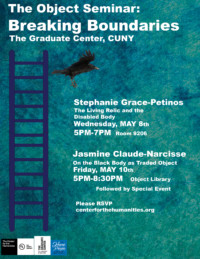
Join us for the next fascinating seminar in our series with Stephanie Grace Petinos: The Living Relic and the Disabled Body
Wednesday, May 8th 2019, 5:00 PM – 7:00 PM EDT. Room 9206
The Object Seminar: Breaking Boundaries
About this seminar
What happens when we incorporate the non-human material world into academic conversations? As part of the Object Library’s ongoing inquiry into routes to knowledge beyond traditional methods and existing discourses, this series of seminars co-presented with Henri Peyre French Institute invites the public to join us in study once again, taking material culture as our point of departure. With topics ranging across new areas of research, each presenter is encouraged to bring-a-thing-along or propose an object that might sit in creative tension with the seminar discussion. All are welcome, but a commitment to attend is necessary, as is reading in advance any materials supplied.
The Object Seminar: Breaking Boundaries series is co-organized and sponsored by the Henri Peyre French Institute, and The Object Library from the Center for the Humanities at the Graduate Center, CUNY.
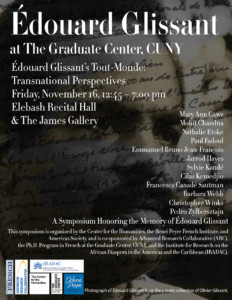
Édouard Glissant's Tout-Monde: Transnational Perspectives
SYMPOSIUM
Fri, Nov 16, 2018, 12: 45 PM – 7:00 PM
Elebash Recital Hall & The James Gallery
This symposium is organized by the Center for the Humanities, the Henri Peyre French Institute, and Americas Society, and is co-sponsored by Advanced Research Collaborative (ARC), the Ph.D. Program in French at the Graduate Center, CUNY, and the Institute for Research on the African Diaspora in the Americas and the Caribbean (IRADAC).
About the symposium:
The year 2018 marks what would have been the 90th birthday of Édouard Glissant (1928-2011), the eminent thinker of Relation and the All-World (Tout-Monde) who taught for sixteen years at the City University of New York’s Graduate Center. Since Glissant's passing, the influence of his thought continues to grow as his works are now taught not only in Europe and the Americas but also in India and China. This symposium, organized by the Henri Peyre French Institute and co-sponsored with Americas Society, the Center for the Humanities and the Ph.D. Program in French at the Graduate Center, CUNY celebrates the transnational reach of Édouard Glissant's ideas and the continued sustenance they provide to activists, artists, scholars and writers world-wide. It underlines his call for all people to abrogate the walls, real or imaginary, that separate them for all communities to achieve equality and solidarity and embrace the "Poetics of Relation."
Édouard Glissant’s humanist project influenced and engaged colleagues and students alike during his years as Distinguished Professor of French at the Graduate Center of the City University of New York (1995 to 2011), a city in which diverse ethnic and religious groups share a space that allows “Relation” to thrive, be reformulated and constantly rediscovered. The symposium includes academics whom Glissant mentored as well as those who have been inspired by reading him and have applied his thought to their own work and in teaching their own students.
The symposium brings to the fore scholars and artists who apply Édouard Glissant's theories to shed light on inter-communal relations, expose the power dynamics of the privileged versus the marginalized, advocate against boundaries while acknowledging difference, contest dominant hierarchies of race, ethnicity, and gender, and show how texts normalize some groups and make others “other.” The symposium celebrates the many perspectives of the Tout-Monde and brings the “periphery” back to the center of discourse, mindful of the powerful Glissant-inspired motto “Les Périphériques vous parlent!” (The Periphery is speaking to you!).
Speakers and presenters include:
Mary Ann Caws, Mohit Chandna, Nathalie Etoke, Paul Fadoul, Emmanuel Bruno Jean-François, Jarrod Hayes, Sylvie Kandé, Cilas Kemedjio, Francesca Canadé Sautman, Barbara Webb, Christopher Winks and Pedro Zylbersztajn.
We will end the day-long symposium "Édouard Glissant's Tout-Monde: Transnational Perspectives" in The James Gallery with a reading by Mary Ann Caws in both French and English from her own translation of Édouard Glissant's epic poem Le Sel Noir, followed by a reception.
This symposium coincides with the exhibition Lydia Cabrera and Édouard Glissant: Trembling Thinking at the Americas Society.
For more about Édouard Glissant Programming

Spring 2018
The distinguished scholar of the French Renaissance, Mireille HUCHON, will honor us with her presence on March 26 and 27th, following the annual RSA meeting:
Renaissance Workshop & Public Lecture by Mireille Huchon March 26 and 27!
Professor Mireille Huchon, Senior Member of the Institut Universitaire de France, and Vice-President of the Société d’Histoire Littéraire de la France, Director of the series Etudes et Essais sur la Renaissance, Textes de la Renaissance, Les Mondes de Rabelais and co-director of the collection Bibliothèque de la Renaissance aux éditions Classiques Garnier, will speak on:
"RABELAIS EN GRAND ARCHITECTE"
On Tuesday, March 27th, room 9207, 6 PM
There will also be a workshop on early modern work in progress in dialogue with Professor Huchon, on March 26th. Place: French thesis room, 2pm-5pm
The French PhD Program at the CUNY Graduate Center is excited to announce its upcoming graduate student conference: "Fabrications of Reality - Fabriques du réel". The conference will take place on March 24th, 2017.
We invite papers from all disciplines that examine early modern, modern, and postmodern fabrications of reality in French-language texts from a wide variety of perspectives: literature, theory, philosophy, gender, art history, film and media studies, sociology, economics, neuroscience, medicine, psychology, and psychoanalysis.
Storytelling and fiction aren’t solely found in literature. Prevalent ideologies also tell us stories that determine and shift our perception of reality. At the same time, reality seems to have become more and more unreadable; supposedly objective sources of knowledge (such as pre-election polls) have become unreliable. There is, of course, no objective reality, only fabrications. More interesting is how our realities are fabricated, both in life and in literature. Authors have approached the fabrication of the text, or text as fabric, in a multitude of ways. Writers and scholars from François Rabelais to Michel Foucault have written extensively on ways of revealing and subverting the fabricated realities of dominant structures of power, through vastly different methodologies. Roland Barthes unraveled the idea of literature as a fixed and singular object, turning it into a landscape that could be entered and explored with his Mythologies and his extensive research on the text. At the same moment as the field of linguistics was opening up literary critique, and transforming varied forms of social discourse into “text,” concepts of reality began to incorporate and absorb notions from literature.
Thus, Daniel Chartier writes that every location is just as shaped by the experiential and phenomenological qualities of its inhabitants as by its physical characteristics, a unified strata of discourses (l’idée du lieu). Similarly, maps as texts confront us with this impossibility of knowing, of reading the world objectively or accurately, limited as they are by their creators’ knowledge, desires, and political alignments. Fictitious borders are invented, shaped by power, traced onto maps, and then applied to the world. For José Muñoz, “queer world-making, then, hinges on the possibility to map a world where one is allowed to cast pictures of utopia and to include such pictures in any map of the social” (Cruising Utopia). Muñoz argues that queerness is never yet arrived, but continually constructed as the “not yet.” In this sense, fabrication is the continual creation of utopian potential. How can literature develop these potentialities, whether by reflecting, distorting, or shaping (and being shaped) by our realities?

Judicial Truth and Cinematographic Truth: The Filming of the Eichmann Trial
Lecture
Join us for a celebration of the 100th birthday of Haitian playwright and novelist Marie Chauvet.
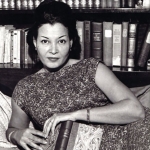
Monday, October 24
6:30pm Readings + 2:00pm Symposium
The Segal Theatre
(The Graduate Center CUNY, 365 Fifth Ave at 34th St)
Free +Open to the Public
First come, first served
We livestream our events at www.theSegalCenter.org/home
Please check back on the day of the event
SYMPOSIUM AND READING SCHEDULE:
2:00pm
OPENING REMARKS & WELCOME
Régine Isabelle Joseph (CUNY) &
Francesca Sautman (Ph.D. Program in French, The Graduate Center CUNY; Henri Peyre Institute)
2:15pm
Panel 1: STAGING REVOLUTION: CHAUVET'S DANCE ON THE VOLCANO Reading of excerpt in English from La Danse sur le volcan (Dance on the Volcano) by Gina Athena Ulysse. Panel Discussion with Jeremy Glick (Hunter College, CUNY) and Stéphanie Bérard (Institut d'Etudes Théâtrales), moderated by Kaiama L. Glover.
4:00pm
Panel 2: CONFLICT(ED) BODIES: CHAUVET'S REVOLTING AESTHETICS Reading of excerpts in English from Chauvet's Colère by Gina Athena Ulysse.
Panel Discussion with Christian Flaugh (University of Buffalo, SUNY) and Régine Michelle Jean-Charles (Boston College), moderated by Alessandra Benedicty-Kokken.
6:30pm
OPENING REMARKS
Thomas Spear (Graduate Center/ Lehman College, CUNY)
Performance of excerpts in English from La Légende des fleurs (The Legend of the Flowers, translated by Alessandra Benedicty-Kokken); Jose Pliya's theatrical adaptation of Amour (Love, translated by Lena Taub Robles); and Les Rapaces (Birds of Prey, translated by Carolyn Shread), directed by Alice Reagan. Read by Kate Abbruzzese, Grant Chapman, Cloteal L. Horne, Alvin Keith, and Zainab Musa.
Followed by panel discussion with Gina Athena Ulysse, Alice Reagan, Judith Miller, and Frank Hentschker.
The Martin E. Segal Theatre Center,
CUNY Graduate Center,
365 Fifth Avenue at 34th Street.
For more about the Segal, please visit our website thesegalcenter.org
Marie Chauvet was forced to flee Haiti after publishing works critical of the race and class structures undergirding Haitian society and politics during the totalitarian regime of François "Papa Doc" Duvalier. Her most well-known work, the trilogy Love, Anger, and Madness, was first published in Paris in 1968 with the support of Simone de Beauvoir, bringing her much acclaim and putting her life in great danger. Exiled from Haiti, leaving her affluent family behind, Chauvet spent the final years of her life in New York City, where she worked as a maid and died in relative poverty in 1973. It is only in the last two decades that Chauvet's work has been given critical attention, enjoying re-editions in French and translations in English and Spanish. Though best known as a novelist, Chauvet was also a playwright, and much of her prose fiction is written as dramatic dialogue.
Organized by Professors Alessandra Benedicty-Kokken (City College of New York, CUNY) and Kaiama L. Glover (Barnard College, Columbia University) in collaboration with Frank Hentschker (The Segal Center), the program will bring together scholars, experts, and theatre artists to introduce Chauvet's work for the stage.
The event is co-presented and made possible by the Henri Peyre French Institute, Program Director, Francesca Sautman with additional support from IRADAC (Institute for Research on the African Diaspora in the Americas and the Caribbean), GC CUNY
Spring 2016
May 4th
STORMING PAPA DOC
EOJ AUDITORIUM
1638 BEDFORD AVENUE | BROOKLYN, NY 11225
Haïti, 2013, Documentary, 1hr30, animation, English Version
This event is part of the Colloquium Impunity, Responsibility and Citizenship – HAITI and of a series of events on Haiti presented through March, April and May at Medgar Evers College in collaboration with the Caribbean Research Center, the Caribbean Cultural Theater and the Center for Black Literature.THIS EVENT IS FREE AND OPEN TO THE PUBLIC to the limit of the facilities capacity.
Friday April 15, 2016, 7:00PM-9:00 PM
Room 9205 The Graduate Center
The Seminars on Graduate Center Work in French and Francophone Studies
A Conversation on the Art of Translation: Donald Nicholson Smith and Chris Clarke with Peter Consenstein
On the occasion of the recent publications by NYRB Classics of Jean-Paul Clebert's Paris Vagabond (Donald Nicholson Smith) and Patrick Modiano's In the Cafe of Lost Youth (Chris Clarke)
Christopher Clarke is a doctoral candidate in French. His translations include work by Éric Chevillard (Masters Thesis), Raymond Queneau (New Directions), Olivier Salon (Words Without Borders), and Patrick Modiano with NYRB Classics, the occasion of this celebration. He is currently translating a novel by Pierre Mac Orlan, Mademoiselle Bambù. He is an Associated Member of the ANR DifdePo, and through the ALGORITM seminar, is involved in the transcription and digitization of the OuLiPo archives. Chris teaches at Brooklyn College.
Donald Nicholson-Smith was born in Manchester, England and is a longtime resident of New York City. He came across Clébert's Paris insolite as a teenager and has long wished to bring it to an Anglophone audience. Among his many translations are works by Paco Ignacio Taibo II, Henri Lefebvre, Raoul Vaneigem, Antonin Artaud, Jean Laplanche, Guillaume Apollinaire, Guy Debord, Jean-Patrick Manchette, Thierry Jonquet, and (with Alyson Waters) Yasmina Khadra. For NYRB Classics he has translated Manchette's Fatale and The Mad and the Bad, which won the 28th Annual Translation Prize of the French-American Foundation and the Florence Gould Foundation for fiction.
Peter Consenstein is Professor of French at Borough of Manhattan Community College and The Graduate Center. A scholar of the group OULIPO and of contemporary experimental French poetry with a particular interest in Jacques Roubaud, he is also an active translator. His publications include a translation of Dominique Fourcade, IL, IT, (La Presse, 2009), a work on Literary Memory, Consciousness, and the Group Oulipo (Amsterdam: Rodopi, 2002), and a Casebook on Jacques Roubaud’s The Great Fire of London which he edited for Dalkey Archive Press, 2002.
Thursday, April 7, 2016, at 4:30pm
Mobility and Replication: A Medieval Technology for the Management of Urban Identity.
A Guest Lecture by Distinguished Medievalist Brigitte M. Bedos-Rezak (NYU –Department of History)
 A particular category of signs of identity, seals, circulated in urban spaces as a form of public platform. Serving their owners both as self-extension and as means of engagement with their environment, seals relayed urban identity as it flowed in a concourse of multiple devices, even as seal users themselves circulated and inflected identity beyond its network of media. This talk will consider the ways in which mobility, in predicating particular modes of signification, afforded medieval cities and citizens a mechanism for the ongoing construction, performance, and communication of their plural personality, while the replicated nature of seal impressions, by forming a continuing series of repeated statements, created a trans-temporal template that may well have fostered identity as mobilization.
A particular category of signs of identity, seals, circulated in urban spaces as a form of public platform. Serving their owners both as self-extension and as means of engagement with their environment, seals relayed urban identity as it flowed in a concourse of multiple devices, even as seal users themselves circulated and inflected identity beyond its network of media. This talk will consider the ways in which mobility, in predicating particular modes of signification, afforded medieval cities and citizens a mechanism for the ongoing construction, performance, and communication of their plural personality, while the replicated nature of seal impressions, by forming a continuing series of repeated statements, created a trans-temporal template that may well have fostered identity as mobilization.
Sponsored by the Pearl Kibre Medieval Study, the Henri Peyre French Institute and the Doctoral Students’ Council
https://pkms.commons.gc.cuny.edu/
The Graduate Center, CUNY, Room 9206
Friday, March 4th, 2016, 4:30-7:00 p.m.
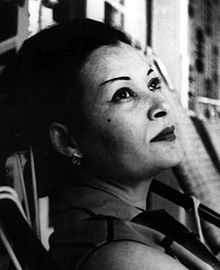 The Ph.D. Program in French and the Henri Peyre French Institute present
The Ph.D. Program in French and the Henri Peyre French Institute present
a Centennial Celebration of Marie Vieux Chauvet
CUNY Graduate Center, Fourth floor lounge (French and Urban Education)
Specialists and scholars will speak of the importance and legacy of the works by Marie Vieux Chauvet.
The program will include readings of texts by Chauvet performed by the New Yorkbased
poet and artist, Michèle Voltaire Marcelin.
Alessandra Benedicty-Kokken, Center for Worker Education at CCNY, CUNY
Kaiama L. Glover, Barnard College, Columbia University
Régine Joseph, Queens College, CUNY
Jasmine Narcisse, doctoral candidate, the Graduate Center, CUNY, and board member of the Henri Peyre French Institute
Emmelie Prophète-Milcé, writer, and director of the Bibliothèque Nationale d’Haïti
Lucienne Serrano, emerita, York College and the Graduate Center, CUNY
Thomas C. Spear, Lehman College and the Graduate Center, CUNY
Free and open to the public, the program will likely include English and Creole,
but will primarily be in French.

